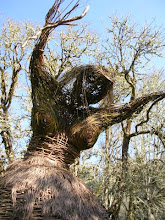
A while back I wrote about the synchronicity of finding a common thread in the diverse books one reads. So I recently finished Bill Bryson’s I’m a Stranger Here Myself, Byron Rogers' The Green Lane to Nowhere, and Alexander McCall Smith’s Tears of the Giraffe.
The first is a series of essays that Bryson wrote for a British newspaper when he moved back to the United States with his English wife and children after living in England for 20 years. The Green Lane is a writer’s life in an English Village. (And no, that’s not the thread.) The Tears of The Giraffe is a title in the "No. 1 Ladies’ Detective Agency" series.
The No. 1 Ladies’ Detective Agency novels are set in Botswana, where Precious Ramotswe (a woman of traditional figure, according to her) investigates the usual domestic situations, as well as local mysteries, from the unexplained appearance of a pumpkin to a missing American and various other matters. Precious has a sensitivity and intuition that often inform her solutions. Smith, a white Botswana, obviously loves the country, the culture, and the people. In this novel, both Mma Ramotswe and Mr. J.L.B. Matekoni (her husband, but always referred to thus even by Precious) lament the loss of old-fashioned cultural values, traditions, etiquette, neighborliness, etc. in the face of modern “progress.” And this is where we find our theme – the loss of culture and community.

Bryson nails it with his essays on an America that has changed much even in the time he has been gone. Neighborhoods, he says, are no longer communities. You may know your nearest neighbors, but you usually have very little in common. Gone are the small communities where everyone not only knew, but supported each other, where neighbors came together in times of need, helped each other, watched out for each other’s children. Shopping areas have become faceless malls, local businesses have withered under the onslaught of chain and discount stores. As for common courtesies, even their memory is fading.

Rogers echoes this subject in this very interesting and amusing book which is, again, drawn from columns published in a British newspaper, this time The Sunday Telegraph. Writing about his small village in geographically strategic Northamtonshire, Rogers tracks the region’s early history, pointing out, for instance, that the current A5 highway traces the path of an ancient Roman road. But throughout he mourns the loss of community, stating that “city people” have bought up most of his village’s real estate for weekend retreats, pricing the locals out of the neighborhood. He muses on this as the village clears out after the weekend, leaving a handful of permanent residents during the week. A man in a tavern is mourning not only the loss of a parent, but of the tradition that once brought neighbors to the homes of bereaved families, bearing food and comfort. Most of the small community traditions and observations have been forgotten.
Some will call this progress, but each of these authors suggests that the world could be a better place with a little bit of return to some of the traditional ways of caring for each other, of respecting each other, of aiding each other in times of crisis, of forming communities of common interests and vesting in common welfare; even of just plain politeness. I’m convinced that most of us who remember some of the earlier ways mourn in similar fashion. The question is, what are we going to do about it?




No comments:
Post a Comment